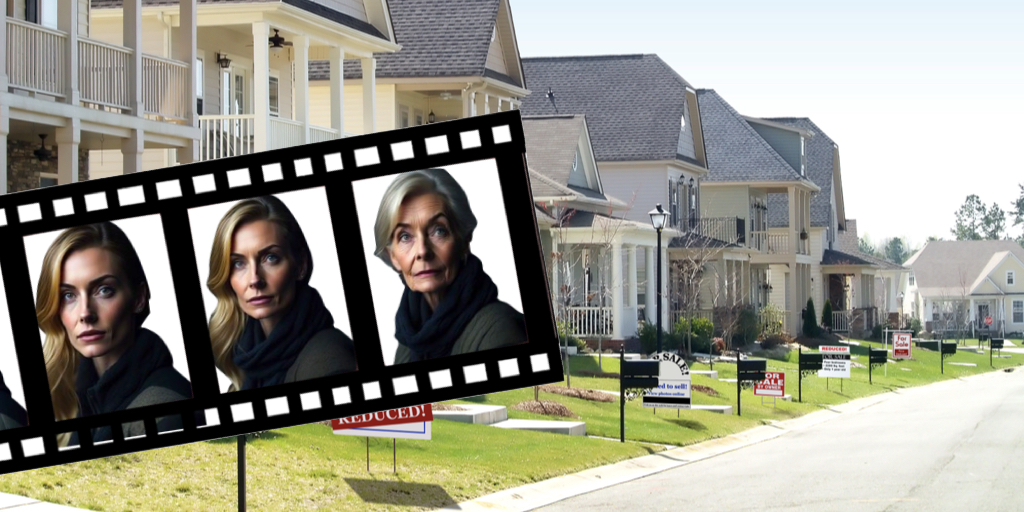 So far in our Becoming the Older Generation series we’ve looked at how to age (or not!) in the best ways possible, and how to care for the caregivers, since it’s a role many of us may find ourselves assuming before or as we become elders.
So far in our Becoming the Older Generation series we’ve looked at how to age (or not!) in the best ways possible, and how to care for the caregivers, since it’s a role many of us may find ourselves assuming before or as we become elders.
Clearly, retirement is not a one-size-fits-all opportunity. How can we right-size retirement, both to help reverse mortgage applicants — and ourselves — embrace aging?
Margaret Manning, founder of Sixty and Me, a community of 50,000 women over 60, suggests we “downsize” to 200 items. What’s intriguing about this idea is that one person’s downsized home is another person’s castle. For instance: When I launched my second business at 40, a seasoned entrepreneur suggested I create a “200 list” of tangible results that clients would receive from working with me. At first I bridled, “200? That’s a LOT!” But as I began to develop the list, it opened up a world of innovative project ideas and creative directions, much of which I’ve put into practice in the ensuing years. So to my mind, “200” has long been associated with a profusion of possibilities, not a sense of downscaling.
To help seniors “right-size into retirement” (and get a sense of whether a reverse mortgage makes sense for their needs) you can discuss what type of home will serve them best, and the items they most want to bring to the next life stage. Manning’s recommendation is a good exercise in detachment, and a wonderful way to free up space, both physical and psychological, for the new to flow in.
Rightsizing can even be a group process, or something a single individual does with a friend: pick a number, pare possessions down to this level, and revel in the freedom simplicity affords — especially if you’re rightsizing to a smaller residence with a HECM for Purchase. Manning offers a step-by-step method for rightsizing, along with some sage cyber advice: instead of moving boxes of paper keepsakes, such as children’s art or scrapbooks, scan them all and create multiple backups. Your grandkids keep everything on their smartphones or social media pages; now you can join them.
One retirement “keepsake” seniors ought to get rid of before they go any further? Debt. That’s financial guru Suze Orman’s advice for getting retirement right. She says, “A recent report from TransUnion found that nearly one in three Americans at least 60 years old has debt, and the average balance is more than $60,000. That’s up sharply from 2005 when 22 percent of the 60+ crowd had debt and the average balance was $40,000.”
Rightsizing for retirement means getting finances in order, along with possessions and perspective for the next phase of life. A reverse mortgage may offer a way to meet these goals, by augmenting style and substance with a sense of security.








3 Comments
FINANCIAL WATER BOARDING
Let the MIP protect the reality of the foreclosure impact on the reverse mortgage program. Send the regulators back to the trenches they dug in front of us. The Financial Assessment regulation must be repealed before it is launched or we will all live to regret it, big time.
The financial water boarding planned for our senior prospects for a reverse mortgage — referred to as the financial assessment — will succeed in washing out what is left of the program in jig time. When next summer rolls around, we will all be looking for work elsewhere. The FA will not contribute to saving the few we’ve been worrying about, that end up in foreclosure. The regulation will mostly succeed in limiting the industry from survival and we will still have foreclosures as before from the very people we qualified under the new rules.
The current hell bent infringement of senior dignities will contribute to the end of the reverse mortgage program as we know it. The widows I have in my pipeline will not cooperate with the demeaning process that in fact it is. Already, the RM process for eligibility has brought sanity to a halt with impacting regulation well beyond the severity of the issues they address. As a well experienced loan officer, I have changed my mind and will urge the RM industry to throw out the demeaning financial assessment regulation before it destroys our means of employment and takes out the very prospects who need help to survive their senior years utilizing their own home equity.
With the FA in place, there will be few takers of the reverse mortgage. Few of our prospects will endure the intense questioning that it requires. The loan officers who came to help them will soon be overwhelmed with regulation to prove eligibility as seniors turn to bankruptcy and other means to survive.
The FA is a self defeating regulation. Read it and weep. Read it again and experience the anger arising in your soul as you visualize the impact of the questions you are required to ask. The order we have been given to read it three times is necessary because we will not believe our eyes what it will do to our livelihood and those of our prospects. There is no wisdom to support this inquisition except that a mean spirited government with their own agenda requires it. The time to fight for senior rights is now. This is truly an insane snf mindless fix for the reverse mortgage program. We will not outlive our stubbornness to succeed if we stand by now while it strangles us.
How long will it take for sanity to restore our senses? Can we restore it after it is ruined completely? These are fair questions now.
The Financial Assessment is not a solution unless your goal is to eliminate the REVERSE MORTGAGE PROGRAM from our list of retirement benefit choices.
Let’s repeal it NOW.
Warren,
Here are words of wisdom. A church father once said to one he was mentoring, “My son, you have added much hot air to the wind.”
The (in)sanity you bring to this discussion is found in statements like: “The order we have been given to read it three times…?” Who gave that “order” to us? Perhaps it was the NMLS, FHA, HUD, or the FTC? No one I account to or any HECM originator I know have received any such orders. It seems you are projecting what you have been told to the entire population of reverse mortgage originators.
What does the following statement have to do with HECM financial assessment? “Let the MIP protect the reality of the foreclosure impact on the reverse mortgage program….” There is no “reverse mortgage program” which includes MIP other than the HECM program. The main cost to the MMI Fund comes from losses at loan maturity not as a result of property charge payment defaults.
Financial assessment is not designed to stop foreclosures other than those which come about from property charge payment defaults. HUD does not pay missed property charge payments, lenders/servicers/note holders do. MIP cannot pay for those losses. It is lenders who want financial assessment, not necessarily brokers. As stated by Franklin Cordell, the head of national consumer lending at Wells Fargo in June 2011 and summarized by the NYT: “For Wells Fargo, however, the inability to assess borrowers’ financial health was the biggest factor for exiting the business.” See http://www.nytimes.com/2011/06/18/your-money/mortgages/18reverse.html
It is reverse mortgage LENDERS who want and have pleaded for years for financial assessment. HUD has tried to put it off and put it off until there was no way to put it off anymore.
I read your outrage but you are sadly misdirected and your views are over the top. If you are that angry, perhaps it is time for you to quit or change careers. It is very unlikely that financial assessment will be nearly as detrimental as you declare. There is little doubt, however, that it will have a very negative impact for a very significant number of prospects. Yet the HECM program will survive with or without you or the widows you “serve.” I think you are badly mistaken and only contributing to some very poor decisions being made by some industry originators.
Like other financial gurus who lack credentials and a broad spectrum of experience, Ms. Orman has unrealistic ideals about debt and its proper use. It is the management of debt which should be the focus not necessarily “no” debt.
The true need for most seniors is to find ways of reducing cash outflow. One of the things which must be thoroughly examined, analyzed, researched, and implemented is a restructuring of debts and their repayments. If seniors can systemically pay down/off debt without significant pain, that course of action needs to be emphasized.
Personal debt with high interest rates or high payments can easily be restructured through a HECM to the extent HECM payouts permit.
It is absolutely idiotic for a senior to originate a fixed rate HECM if they are looking to manage their debt. Without a line of credit to manage cash flow and act as a safety net, systematically paying down a fixed rate HECM is no different than paying down a typical 30 year fixed rate mortgage. It is like throwing cash into a fire especially when the MCA at closing was $625,500 or the appreciation rate on the home is very low, nonexistent, or negative.
So while I espouse the debt ideals of Ms. Orman and Mr. Dave Ramsey in retirement, many times a HECM is THE best way to achieve those goals or at least the wisest way to manage debt during retirement. HECMs allow debtors to create the best payback schedule without penalties for late payments and other credit report dings. It is most ideal for those who want and can pay back debt but find their current minimum payment schedule difficult or interest rates unconscionable.
(The opinions expressed in this comment are not necessarily those of RMS or its affiliates.)